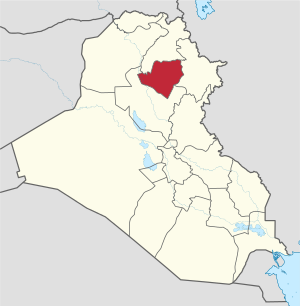Battle of Kirkuk (2015)
| Battle of Kirkuk (2015) | |||||||
|---|---|---|---|---|---|---|---|
| Part of the War in Iraq | |||||||
 Location in Iraq | |||||||
| |||||||
| Belligerents | |||||||
|
|
| ||||||
| Commanders and leaders | |||||||
|
(President of Iraqi Kurdistan) (Commander in Kirkuk) (Brigade commander) |
| ||||||
| Units involved | |||||||
|
Kurdistan:
| Unknown | ||||||
| Strength | |||||||
| 4,000+ | 450 | ||||||
| Casualties and losses | |||||||
|
50 killed 46 wounded | 70–150 killed[1] | ||||||
The Battle of Kirkuk took place in the city of Kirkuk in northern Iraq between Kurdistan and the Islamic State of Iraq and the Levant. On the night of January 29, around 150 ISIL fighters attacked positions south and west of the city of Kirkuk, Iraq, which were temporarily under the control of the Peshmerga. The ISIL offensive began under the cover of dense fog and succeeded in overwhelming Peshmerga positions and seizing the towns of Mala Abdullah, Maryam Beg, Tel Ward and the Maktab Khalid crossing. Parts of the Khabbaz oil fields were also captured, taking 24 workers hostage.[5][6][7][8] At least 25 Peshmerga fighters died including Brig. Gen. Sherko Shwani, commander of the 1st Brigade and the highest ranking head of Peshmerga forces in Kirkuk.[9] Gen. Sherko Shwani was killed after being trapped and shot by attackers, according to another Peshmerga commander.[10] Around 16 other Peshmerga fighters were captured by ISIL, and later killed in a staged execution.[11][12]
The next day, another senior Peshmerga commander, Gen. Hussein Mansour, commander of the 2nd combat support units in the Kirkuk region was killed by sniper fire while leading an attack against Mala Abdullah village.[13][14] The Khabbaz oil fields were also retaken by Peshmerga troops. However ISIL fighters set fire to some of the oil wells before it was cleared.[15][16][17] Kurdish forces retook 8 villages from ISIL.
References
- ^ a b "Kurds reject proposed rival force in Kirkuk". al-monitor.com. 12 February 2015. Retrieved 28 May 2017.
- ^ "Second Kurdish commander killed as Peshmerga retake villages south of Kirkuk". rudaw.net. Retrieved 28 May 2017.
- ^ "Popular Peshmerga commander killed, seven wounded in ISIS attack". rudaw.net. Retrieved 28 May 2017.
- ^ "Second senior Kurdish commander killed as Peshmerga retake villages south of Iraq's Kirkuk". ekurd.net. 1 February 2015. Retrieved 28 May 2017.
- ^ "As Battles Rage In Kirkuk, Political Solutions Are Needed | MERI". www.meri-k.org. Retrieved 2016-03-10.
- ^ "Kurds retake oil facility in north Iraq, 15 workers still missing". Reuters. 2015-01-31. Retrieved 2016-03-10.
- ^ "Relatives of captured Peshmerga urge prisoner exchange with ISIS". Rudaw. Retrieved 2016-03-10.
- ^ "Heavy Setback For Iraqi Kurds As Clashes With ISIS Kill Top Commander". The Huffington Post. Archived from the original on 2016-01-24. Retrieved 2016-03-10.
- ^ "ISIL fighters driven back from Iraqi oil town of Kirkuk". www.aljazeera.com. Retrieved 2016-03-10.
- ^ "Eight Peshmerga, dozens of militants killed in fighting on various fronts". Rudaw. Retrieved 2016-03-10.
- ^ "Terror group executed 21 captives?". www.arabnews.com. 23 February 2015. Retrieved 2016-03-10.
- ^ "ISIS Major Attack to Kirkuk killed Peshmerga Famous General". en.alalam.ir. Retrieved 2016-03-11.
- ^ "Second Kurdish commander killed as Peshmerga retake villages south of Kirkuk". Rudaw. Retrieved 2016-03-10.
- ^ Mamoun, Abdelhak (February 2015). "A Peshmerga brigade commander killed by ISIS sniper southwest of Kirkuk - Iraqi News". Iraq news, the latest Iraq news by Iraqi News. Retrieved 2016-03-11.
- ^ "Kurds retake oil facility in north Iraq, 15 workers still missing". Reuters. 2015-01-31. Retrieved 2016-03-11.
- ^ Mamoun, Abdelhak (February 2015). "Peshmerga and police control Khabbaz field in Kirkuk, liberate North Oil Company employees - Iraqi News". Iraq news, the latest Iraq news by Iraqi News. Retrieved 2016-03-11.
- ^ "ISHM 2: January 30 - February 6, 2015 - EPIC - Enabling Peace in Iraq Center". 2019-12-13. Archived from the original on 2019-12-13. Retrieved 2024-03-24.